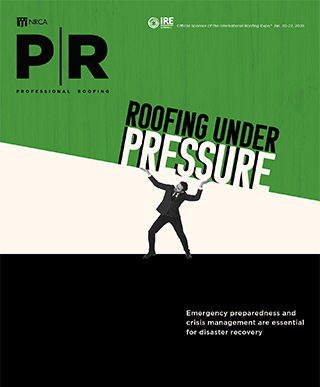As a contractor, you probably have chosen to operate your business as a corporation or limited liability company (LLC). Unlike sole proprietorships, such legal entities protect company owners from personal liability. Given the risks inherent in the roofing contracting business, you would be foolhardy not to protect yourself legally from potential personal liability. But merely forming a corporation or LLC is not enough.
What is the corporate veil?
The corporate veil derives from a concept that a corporation is a separate and distinct "person" under the law and, as such, has the same rights and responsibilities as any other person. If a corporation is a separate person, its owners should not be responsible for the corporation's liabilities unless the owners expressly agree to accept personal liability as may be required when seeking bonding from a surety or line of credit from a bank.
To preserve this theory, a corporation has to comply with various legal requirements. Otherwise, it may be possible for a creditor to "pierce the corporate veil" and force a corporation's shareholders to pay the corporation's obligations, which, of course, defeats the purpose of establishing the corporation in the first place.
Initial organization
The first step to establishing and maintaining limited liability protection is to ensure a corporation is properly organized. Typically, this requires preparing and filing articles of incorporation, issuing shares of stock and preparing minutes establishing certain required steps were taken in the corporation's legal organization. These steps usually include adopting bylaws, electing officers and directors, and authorizing a corporate bank account.
In some states, a new corporation also must file forms with state agencies or publish notifications in specified local legal newspapers. Additional requirements can include obtaining a proper business license, registering as a new business with state agencies, obtaining proper state and federal tax identification numbers, and qualifying under any required state professional licensing or registration requirements.
Ongoing compliance
Properly forming a corporation is critical to establishing liability protection, but maintaining that protection requires ongoing compliance. A corporation must maintain proper registration with its state's corporation compliance department. In most states, this agency is part of the secretary of state's office, and ongoing compliance usually requires annual registration and filing fees. However, these requirements vary among states.
In addition, under most states' corporate laws, a corporation is required to elect directors and officers every year. Because a corporation can take legal action only through its directors and officers, these positions must be properly elected as required; otherwise, no one will be properly authorized to act on behalf of the corporation and, technically, any business-related action taken (such as entering into contracts, leases or other agreements) would be invalid.
Annual elections usually can be handled by written consent of the shareholders or directors, as the case may be, but a corporation might wish to hold physical annual meetings for these purposes.
Similarly, if a corporation conducts business out of state, it must maintain any additional necessary filings and registrations, including tax filings, secretary of state filings and professional licenses where required. In addition, in certain circumstances, a corporation may be required to operate under a fictitious trade name in a state, and maintaining these filings is important to keeping the corporation in compliance and preserving the limited liability protection of the corporate veil.
Piercing the veil
Too often, a business owner files the necessary paperwork to form a corporation, orders a corporate minute book and promptly sticks it on a shelf. After all, the owner is trying to run a business and focus on generating new sales, establishing solid contacts within the business community and ensuring quality service is provided to customers.
However, this pattern of behavior can lead to real exposure for the company's shareholders. If the company encounters difficulties that result in a claim or lawsuit being filed against it, the opposing party could seek to pierce the corporate veil. If the opposing party is successful, everything the shareholders have, such as personal homes, investments, cars, savings, etc., may be used to satisfy the claim.
In other cases, a business owner might not properly segregate corporate assets from his or her personal assets and may use corporate assets to pay for personal obligations or vice versa. This conduct invites a claim for piercing the corporate veil. Courts reason that if a business owner did not treat the corporation as a separate legal entity responsible for its debts and obligations neither should a creditor be held to a legal doctrine based on their supposed separateness.
The best way to avoid this scenario is for a business owner to make sure corporate assets do not intermingle with personal assets; corporate obligations are satisfied with corporate funds and not personal funds (and vice versa for personal obligations); and all personal funds injected into the business are properly tracked and classified as loans or capital contributions. Separate bank accounts are an absolute necessity.
Situations involving loans can be especially harmful. When a company's owners lend it money or vice versa, the transaction should be documented with a promissory note. The note's terms should contain reasonable interest and repayment terms. If money is taken out of the company and treated as a loan, the company should prepare minutes authorizing the loan in addition to issuing a promissory note to the shareholder receiving the funds.
Similarly, the corporation should document real estate and equipment leases, make sure company vehicles are owned in the corporation's name and generally operate the business in such a way that no one can doubt the corporation is being treated as a separate legal entity from its owners.
Holding real estate in a separate entity can be beneficial from an asset protection standpoint, but there needs to be a written lease with reasonable terms, and the lease payments must be made regularly. If a vehicle fleet is maintained, setting up a separate leasing company can help insulate a company from liability arising out of vehicle ownership, but, again, the paperwork should be prepared properly.
Issues such as a company paying for owners' country club dues or vacation expenses or purchasing vehicles for personal use by shareholders also should be carefully reviewed. To be a proper business expense, any use of corporate funds needs to promote a business purpose and be reasonable in amount. Some expenses of this nature can be legitimate, but using a corporation as a source of cash to purchase personal items will lead to significant risk of piercing the corporate veil.
If a corporation follows conservative guidelines for tax deductibility of such expenses and properly documents each use and purpose, the chances of piercing the corporate veil are diminished.
The corporate audit
Because there are many potential pitfalls in keeping the corporate veil in place, a corporate audit conducted by a knowledgeable corporate attorney can be valuable and should include the following:
- A review of the corporate records and minute book
- A confirmation of the corporation's filing status with the secretary of state or other state corporate department
- A review of the contracting company's records related to ownership of real estate, vehicles and equipment
- A review of existing contracts and other agreements in place
Once a corporate audit is performed, the company should be advised of the steps necessary to make sure the corporate veil is protected as fully as possible.
Recent court decision
In a decision issued Aug. 27, 2010, the Court of Appeals of Texas upheld a jury's verdict finding a roofing contracting company's owner personally liable for the company's breach of contract and deceptive trade practices.
In this case, the corporate veil was pierced because the business owner closed the business after an attorney representing a homeowner sent him a letter threatening a lawsuit for leaks in the homeowner's roof. After closing the business, the business owner distributed all the company's profits to himself and his wife, who were the corporation's president and secretary, respectively, and the company's sole shareholders.
The homeowner contracted with a Dallas-based roofing company in 2003 to repair the tile roof on the homeowner's residence for $4,500. Three years later, the homeowner noticed leaking water and called the roofing contractor. The contractor sent a crew to perform repair work costing $695. Several months later, when more leaks were discovered, the homeowner hired another company to repair the roof at a cost of $3,429.
In September 2006, the homeowner's lawyer sent the roofing company a letter threatening a lawsuit. In November 2006, the roofing company's president dissolved the corporation. The homeowner subsequently sued the company and company president individually for breach of contract and violations of Texas' Deceptive Trade Practices Act (DTPA).
A jury found the roofing company had breached its contract by failing to repair the homeowner's roof and that the company violated the DTPA. The jury further found the company owner was responsible for the company's conduct and, therefore, should be personally liable under a theory of personal liability commonly referred to as the alter ego doctrine.
Traditionally, the alter ego doctrine has been applied by Texas courts to pierce the corporate veil when, as stated by Texas courts, there is "a unity between the corporation and the individual to the extent that the corporation's separateness has ceased, and holding only the corporation liable would be unjust."
A Texas statute states a company shareholder may face personal liability if an obligee (a party to whom a corporate obligation is owed) "demonstrates that the shareholder caused the corporation to be used for the purpose of perpetrating and did perpetrate an actual fraud on the obligee primarily for the direct benefit of the [share]holder."
On appeal, the roofing contractor challenged the evidence supporting the jury's finding, but the Texas Court of Appeals affirmed the jury's verdict. As stated by the court, the corporate form typically will insulate shareholders, officers and directors from liability for corporate obligations, "but when these individuals abuse the corporate privilege, courts will disregard the corporate fiction and hold them individually liable."
In support of the jury's verdict, the appellate court recited some evidence that had been presented at trial. The contractor and his wife, as sole shareholders, had complete control over the roofing company and collected all profits from the business. The corporate tax returns for 2003-06 showed for each of those years the entire amount of the company's ordinary business income was distributed in equal amounts to the owner and his wife. Financial documents also showed that in June 2006, the contractor accepted a $51,000 loan from the company. Although the contractor testified the loan was paid with interest, the financial documents did not establish that fact.
The most important evidence supporting personal liability was that, after receiving the demand letter from the homeowner's attorney threatening suit in September 2006, the contractor dissolved his business. The dissolution documents represented that all the roofing company's debts, liabilities and obligations had been satisfied or provided for and all remaining company property and assets had been distributed to the owner and his wife. No funds were set aside for the company's possible liability to the homeowner.
The contractor testified his bank's president advised him to close the corporation because forged checks were being written on the corporate account. The bank president did not testify, but there was testimony at trial that the forged checks were paid by the bank in May (about six months earlier). An assistant vice president of the bank testified that in May she had recommended the contractor close the account—not his business—to stop the forged checks.
The contractor argued he never dealt with the homeowner personally and that because the jury found the breach of contract and DTPA violation against the corporation, the homeowner should seek damages from the roofing company, not the contractor personally. However, according to the court, the roofing contractor destroyed that option when he dissolved his company and took its assets and property for himself.
Consequently, the appellate court ruled there was sufficient evidence for the jury to conclude holding only the roofing company liable would result in injustice. Furthermore, the jury was not wrong to determine the contractor's conduct met the statutory definition of "actual fraud" as "dishonesty of purpose or an intent to deceive" stated in the Texas Business Organizations code.
Do it correctly
Setting up a corporation to operate a business is one part of good planning to protect company owners from potential personal liability. However, once a corporation is formed, owners must remain involved to make sure those protections remain in place. Merely forming the entity and filing the documents will not be enough to provide proper protection.
Compliance with the necessary steps is not usually difficult, but failing to take these simple steps can result in significant personal exposure that could have been avoided. A corporate compliance audit can provide the peace of mind that personal assets are protected.
Scott D. Calhoun and Stephen M. Phillips are attorneys with the Atlanta-based law firm Hendrick, Phillips, Salzman & Flatt.
What about LLCs?
Some people are confused about what a limited liability company (LLC) is. Technically, an LLC is not a corporation or even a type of corporation. An LLC is a different, relatively new, legal entity completely distinct from corporations, limited partnerships or any other business entity. But LLCs are similar to corporations in that they provide limited liability protection to their owners, who are called members, rather than shareholders. Maintaining the limited liability protection provided by an LLC is critical.
Typically, state laws impose fewer requirements on LLCs for ongoing compliance than on corporations. LLCs generally do not have to conduct annual meetings or elect directors or officers every year; however, they have to comply with state filing requirements and licensing standards.
In addition, LLCs must operate as separate and distinct entities much the same as corporations, particularly with respect to bank accounts, payment of obligations, intermingling of assets, etc. For that reason, LLC owners should pay careful attention to these operational issues to ensure liability protection remains in place.



